As a recruiter or hiring manager, finding the right C developer for your team is crucial for driving successful software projects. Companies often struggle with identifying the specific skills and qualifications required for this niche role, leading to longer hiring cycles and mismatched candidates. Understanding the fundamental tasks of a C developer and the ideal candidate profile can streamline your hiring process and improve the quality of your hires.
In this article, we will cover everything you need to know about hiring a C Developer, from crafting the perfect job description to structuring interviews. We'll also guide you through recommended assessment tests and highlight top platforms to source skilled candidates. For further insights, you can check our C Developer Interview Questions.
Table of contents
Why hire a C Developer?
Hiring a C Developer can be a game-changer for companies dealing with performance-critical applications or systems programming. These specialists excel in creating efficient, low-level code that directly interacts with hardware, making them invaluable for projects requiring speed and resource optimization.
Consider bringing a C Developer on board if you're facing challenges like:
- Optimizing existing software for better performance
- Developing embedded systems or device drivers
- Creating cross-platform applications that need to run on various hardware
Before committing to a full-time hire, assess your project scope and timeline. For short-term or specialized tasks, you might start with a C Developer skills assessment to gauge potential candidates or consider working with a consultant to address immediate needs.
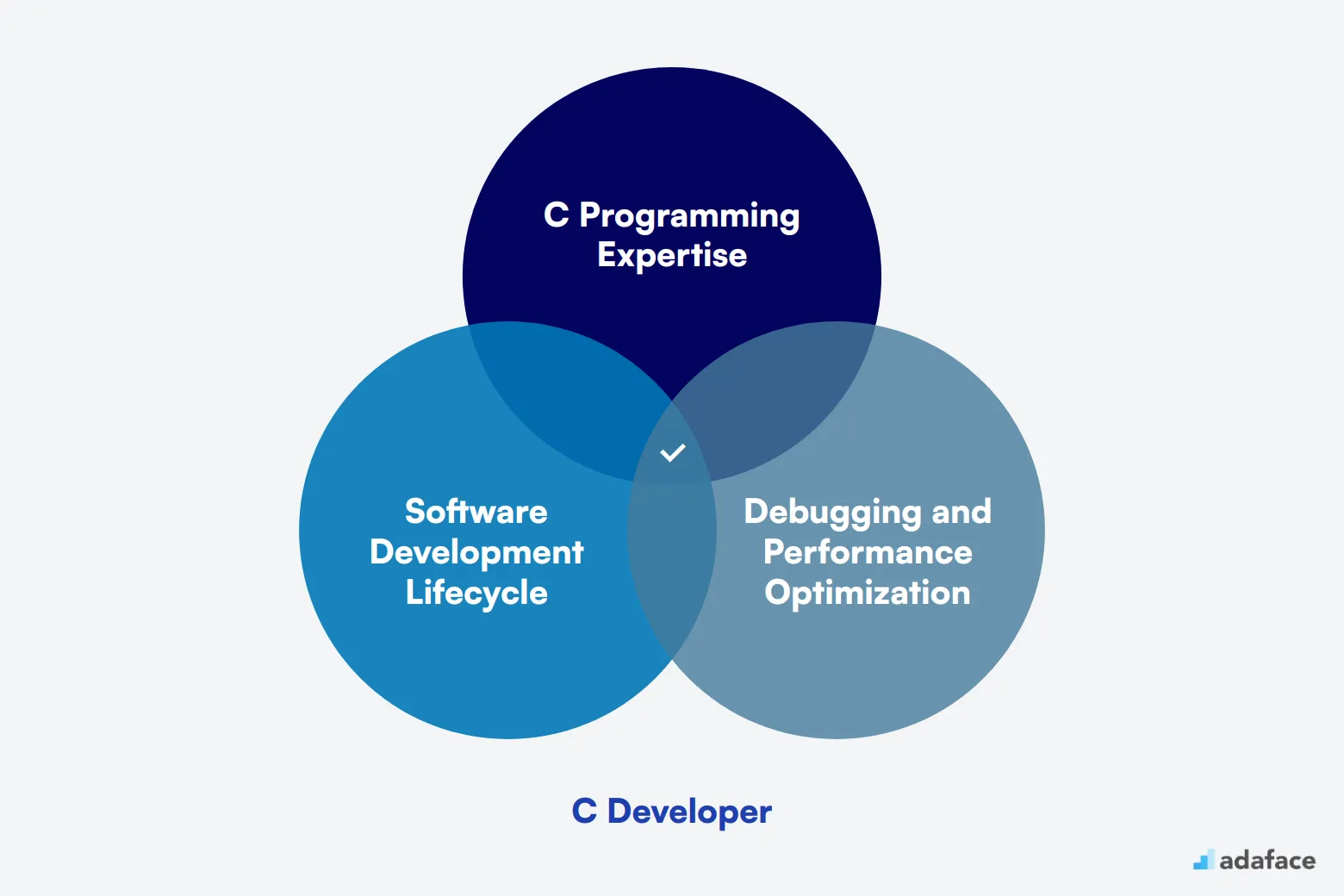
What does a C Developer do?
A C Developer is responsible for creating and maintaining software applications using the C programming language. They work on various projects, from embedded systems and operating systems to desktop applications and games, leveraging C's power and efficiency.
The day-to-day tasks of a C Developer include:
- Writing clean, efficient, and well-documented C code
- Debugging and troubleshooting existing code
- Optimizing software performance
- Collaborating with other developers and stakeholders
- Implementing new features and maintaining existing ones
- Conducting code reviews and ensuring code quality
- Staying updated with the latest C programming trends and best practices
Key Skills and Qualifications for a C Developer
Hiring a C Developer can be tricky, especially when defining the ideal candidate profile for your organization. Different companies may prioritize various skills, leading to potential mismatches in expectations. It's important to distinguish clearly between required and preferred qualifications to streamline your hiring process.
Here are some essential skills and qualifications you should consider when assessing candidates for this role:
- Required Skills:
- Strong proficiency in C programming language
- Experience with debugging and performance optimization
- Solid understanding of software development methodologies
- Proficiency with version control systems like Git
- Bachelor’s degree in Computer Science or related field
- Preferred Skills:
- Experience with embedded systems development
- Familiarity with C++ and other programming languages
- Knowledge of real-time operating systems (RTOS)
- Experience in developing cross-platform software
- Good understanding of network programming
| Required skills and qualifications | Preferred skills and qualifications |
|---|---|
| Strong proficiency in C programming language | Experience with embedded systems development |
| Experience with debugging and performance optimization | Familiarity with C++ and other programming languages |
| Solid understanding of software development methodologies | Knowledge of real-time operating systems (RTOS) |
| Proficiency with version control systems like Git | Experience in developing cross-platform software |
| Bachelor’s degree in Computer Science or related field | Good understanding of network programming |
How to Write an Effective C Developer Job Description
Once you've identified the ideal candidate profile for your C Developer role, it's time to craft a compelling job description. A well-written JD is key to attracting top talent. Here are some quick tips to help you create an impactful C Developer job description:
- Highlight key responsibilities: Clearly outline the primary tasks, such as developing and maintaining C-based applications, optimizing code performance, and collaborating with cross-functional teams.
- Balance technical requirements with soft skills: List must-have technical skills like proficiency in C programming and familiarity with data structures, but also emphasize the importance of problem-solving and communication abilities.
- Showcase your company's unique selling points: Highlight exciting projects, growth opportunities, or any cutting-edge technologies your team works with to make your offer stand out.
- Be specific about the development environment: Mention the tools, frameworks, and methodologies your team uses to give candidates a clear picture of what to expect.
Top Platforms to Hire C Developers
Now that you have a job description ready, it's time to post it on job listing sites to attract potential candidates. The right platform can make a big difference in finding qualified C developers. Let's explore some popular options to help you reach the right talent pool.
LinkedIn Jobs
Ideal for posting full-time C Developer positions. Large professional network allows for targeted job listings and passive candidate searches.

Indeed
Versatile platform suitable for posting all types of C Developer roles. High traffic ensures good visibility for job listings.

Dice
Specialized in tech jobs, perfect for targeting experienced C Developers. Offers advanced search features for specific skills and experience levels.
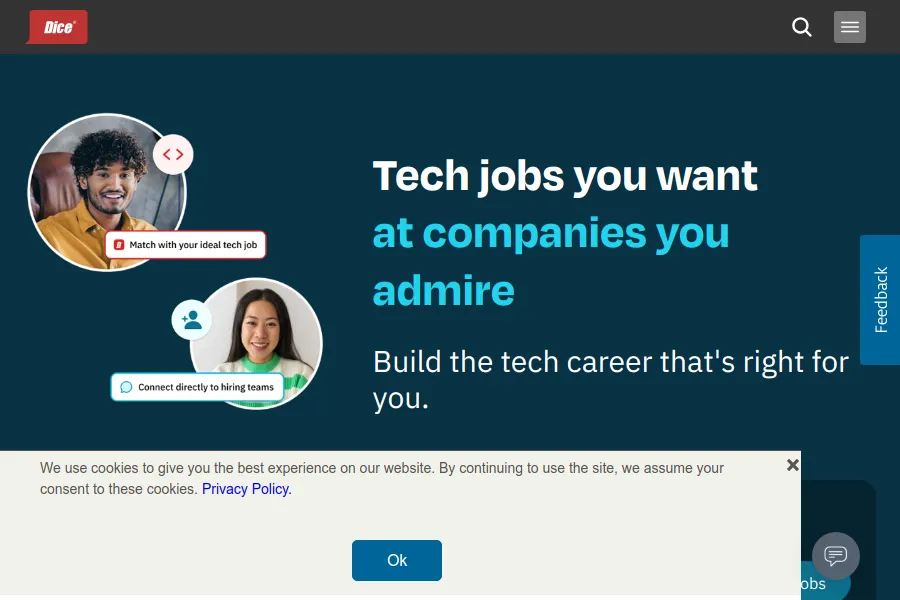
Beyond these major platforms, there are specialized sites catering to different hiring needs. These include Toptal for elite freelancers, Upwork for flexible project-based hiring, and Stack Overflow Jobs for tapping into the developer community. GitHub Jobs is great for open-source focused roles, while AngelList caters to startups. Each platform offers unique advantages, so consider your specific requirements when choosing where to post your C developer job listing.
Keywords to Look for in C Developer Resumes
Resume screening is a key step in finding the right C Developer. It helps you quickly identify candidates with the skills and experience you need, saving time in the hiring process.
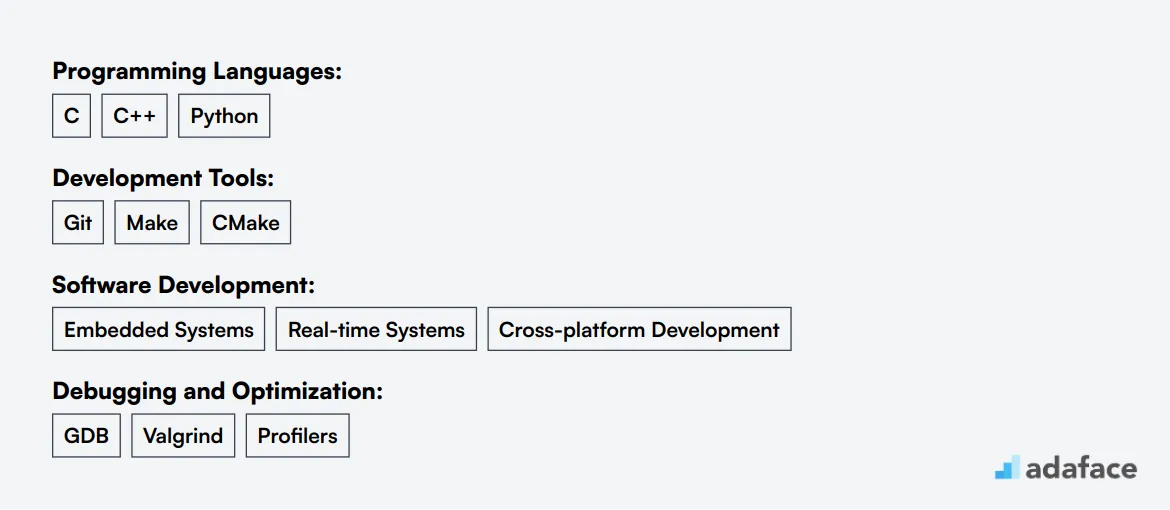
When manually screening resumes, focus on key technical skills. Look for keywords like 'C programming', 'debugging', 'version control', and 'software development methodologies'. These align with the core skills required for C Developers.
AI tools can streamline the screening process. You can use ChatGPT or similar AI to analyze resumes based on your specific criteria. This can help you quickly sort through large numbers of applications.
Here's a sample prompt for AI resume screening:
TASK: Screen resumes for C Developer role
INPUT: Resumes
OUTPUT: For each resume, provide:
- Email id
- Name
- Matching keywords
- Score (out of 10)
- Recommendation
- Shortlist (Yes, No, Maybe)
KEYWORDS:
- C programming
- Debugging
- Version control (Git)
- Software development methodologies
- Embedded systems
- Cross-platform development
Customize this prompt based on your specific needs and the C Developer job description you're hiring for.
Recommended Skills Tests for Assessing C Developers
Skills tests are a great way to evaluate C developers objectively. They help you assess candidates' practical abilities beyond what's listed on their resumes. Here are five key tests we recommend for screening C developers:
C Programming Test: This C online test evaluates a candidate's proficiency in C syntax, data structures, and problem-solving skills. It's ideal for assessing fundamental C programming knowledge.
Embedded C Test: For roles involving embedded systems, an Embedded C test is valuable. It assesses skills in memory management, interrupt handling, and real-time operating systems.
Data Structures Test: A strong grasp of data structures is important for C developers. A data structures test can evaluate their understanding of arrays, linked lists, trees, and graphs.
Linux Test: Many C development environments use Linux. A Linux skills test can help assess a candidate's familiarity with the operating system and command-line operations.
Git Test: Version control is crucial in software development. A Git test can evaluate a candidate's ability to manage code repositories and collaborate effectively with team members.
Case Study Assignments to Evaluate C Developers
Case study assignments can be valuable tools for assessing C developers' skills. However, they come with drawbacks like lengthy completion times, low participation rates, and the risk of losing qualified candidates. Despite these challenges, well-designed case studies can offer insights into a candidate's problem-solving abilities and coding practices.
Memory Management System: This case study tasks candidates with designing and implementing a custom memory management system in C. It evaluates their understanding of memory allocation, deallocation, and optimization techniques. This assignment is particularly useful for roles requiring low-level programming skills.
File Compression Utility: Candidates are asked to create a file compression tool using C. This project tests their ability to work with file I/O, implement data structures, and optimize algorithms for performance. It's an excellent way to assess both theoretical knowledge and practical coding skills.
Multithreaded Task Scheduler: This assignment involves building a task scheduler that can handle multiple threads concurrently. It evaluates a candidate's understanding of concurrency, synchronization, and system-level programming in C. This case study is ideal for positions that require expertise in operating systems and parallel programming.
How to Structure the Interview Stage for Hiring C Developers
After candidates pass the initial skills tests, it's time to move them to the technical interview stage to further assess their hard skills. Skills tests are great for filtering out unqualified candidates, but interviews help identify the best fit for the role. This stage is crucial for evaluating candidates' problem-solving abilities and their understanding of C programming concepts.
Here are some recommended interview questions to ask C Developers: 1. Explain the difference between 'malloc' and 'calloc' in C. This tests their understanding of memory allocation. 2. How would you implement a linked list in C? Helps gauge their knowledge of data structures. 3. Describe the role of pointers in C programming. Tests their grasp on a core concept in C. 4. What are static variables, and when would you use them? This question checks their understanding of variable scope and duration. 5. How does a 'switch' statement differ from 'if-else'? Evaluates their decision-making in choosing the right control flow. For more specific questions, consider the C Developer Interview Questions.
Cost of Hiring a C Developer
The cost of hiring a C Developer varies based on location and experience. In the United States, the average salary for a C Developer is around $117,209, with a range from $72,885 to $169,199. In Canada, the average is approximately $106,343 CAD per year, ranging from $81,740 CAD to $133,390 CAD.
Keep in mind that these figures are just averages. Actual costs may differ based on factors like the developer's expertise, project complexity, and your company's location. It's always a good idea to research current market rates in your specific area when budgeting for a C Developer role.
C Developer Salary in the United States
C Developers in the United States earn a median salary of approximately $111,050. Salaries can range significantly, with some positions paying as low as $72,885 and others offering up to $169,199. On average, the salary is around $117,209, making it a lucrative field with opportunities across different states and regions.
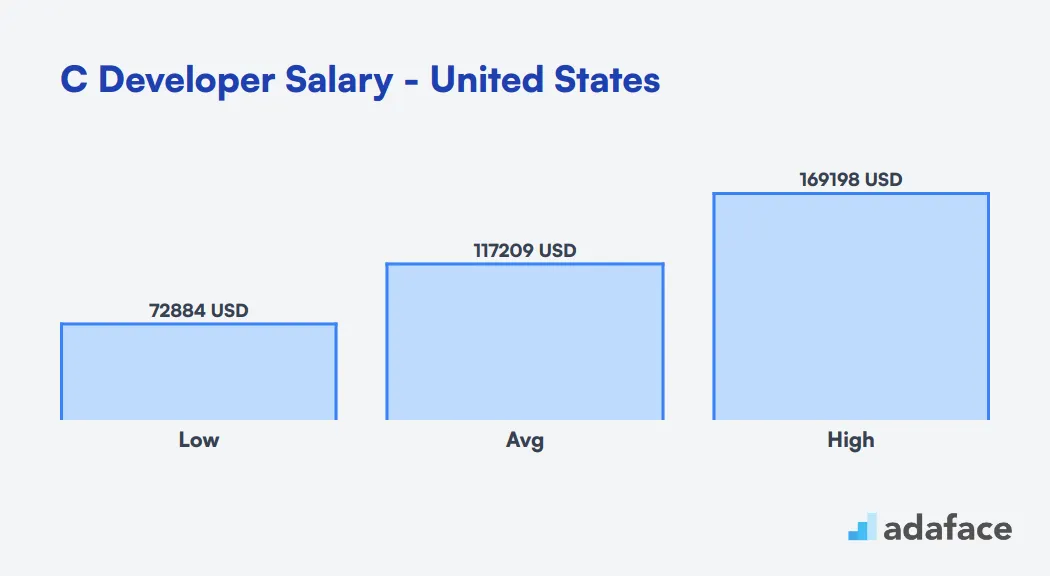
C Developer Salary in Canada
In Canada, C Developer salaries vary significantly based on location. Nationally, the average salary is approximately $106,343 CAD per year. Salaries range from $81,740 CAD to $133,390 CAD. For instance, in Calgary, AB, the median salary is about $121,779 CAD, while in Toronto, ON, it's approximately $91,014 CAD. It's essential to consider these regional differences when budgeting for C Developer roles.
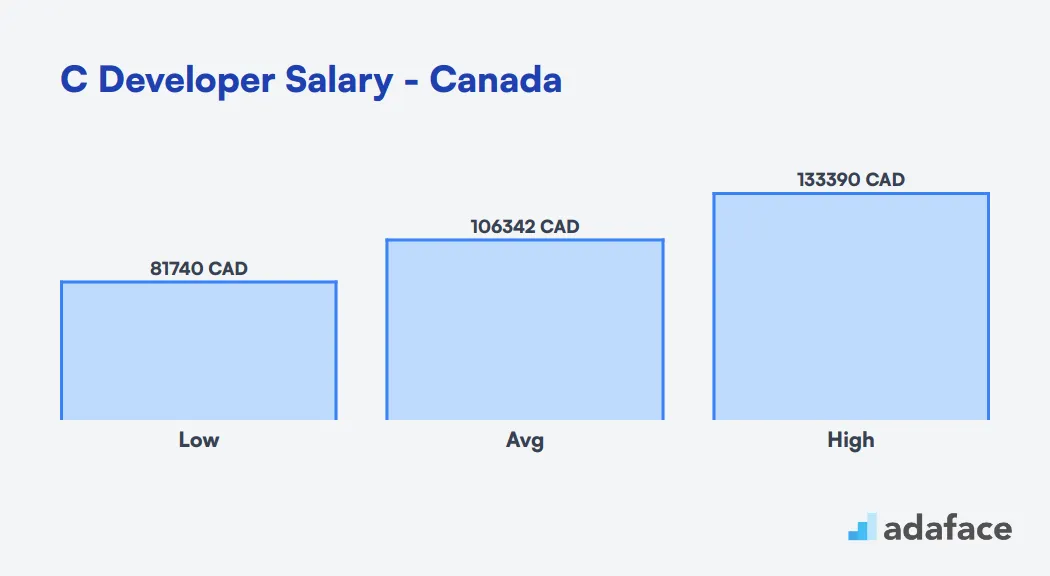
What's the difference between a Systems C Developer and an Application C Developer?
At first glance, Systems C Developers and Application C Developers might appear to be interchangeable, but their focus areas and skill sets differ significantly. This distinction is important for recruiters and hiring managers to understand in order to find the right match for their projects.
A Systems C Developer is primarily concerned with low-level system programming. They focus on tasks like memory management and operating system internals. Their typical projects include device drivers and embedded systems, often on Linux/Unix platforms. They utilize libraries such as POSIX and pthreads, and rely on debugging tools like GDB and Valgrind. Additional knowledge of assembly and hardware architecture is beneficial in this role.
In contrast, an Application C Developer deals with high-level application development. Their work centers around user interface and experience, algorithms, and data structures. They frequently develop desktop applications and business software, often for cross-platform or Windows-centric environments. Common libraries they use include GTK+, Qt, and SDL, and they debug using IDE debuggers and logging frameworks. Knowledge of databases and networking protocols is also important.
Understanding these distinct roles is pivotal for successful hiring. If you're looking to hire a specialized C developer, it might help to use skills assessment tools to pinpoint exactly what you need.
| Systems C Developer | Application C Developer | |
|---|---|---|
| Focus Area | Low-level system programming | High-level application development |
| Primary Skills | Memory management, OS internals | UI/UX, algorithms, data structures |
| Common Libraries | POSIX, pthreads | GTK+, Qt, SDL |
| Performance Emphasis | Hardware optimization, efficiency | User experience, functionality |
| Typical Projects | Device drivers, embedded systems | Desktop apps, business software |
| Debugging Tools | GDB, Valgrind | IDE debuggers, logging frameworks |
| Additional Knowledge | Assembly, hardware architecture | Databases, networking protocols |
| Work Environment | Often Linux/Unix-based | Cross-platform or Windows-centric |
Hire the Best C Developers for Your Team
In this guide, we've covered the key aspects of hiring C developers, from understanding their role and required skills to crafting effective job descriptions and conducting thorough interviews. We've also explored various platforms for finding talent and discussed the importance of skills assessment in the hiring process.
If there's one key takeaway from this post, it's the significance of using accurate job descriptions and skills tests to make your hiring process more precise. Consider incorporating C programming tests into your recruitment strategy to objectively evaluate candidates' abilities and ensure you're bringing the best C developers onto your team.
C Online Test
FAQs
A C Developer is responsible for designing, developing, and deploying software written in the C programming language. They work on both applications and system-level software.
Look for proficiency in the C language, experience with systems or application level coding, problem-solving skills, and knowledge of software development tools and methodologies.
Include clear role responsibilities, required skills and experience levels, and specific project or industry requirements. Make sure to highlight both technical and soft skills needed for the role.
You can find qualified C Developers on various platforms such as LinkedIn, GitHub, Stack Overflow, and niche job boards focused on tech positions.
Use coding tests, such as those offered by platforms like Adaface, technical interviews, and problem-solving case studies to evaluate a C Developer's skills.
A Systems C Developer focuses on low-level programming such as operating systems and embedded systems, whereas an Application C Developer works on higher-level software applications.
Your interview process should include a mix of technical assessments, behavioral questions, and practical coding challenges relevant to the role. Ensure each stage evaluates specific skill sets and competencies.

40 min skill tests.
No trick questions.
Accurate shortlisting.
We make it easy for you to find the best candidates in your pipeline with a 40 min skills test.
Try for freeRelated posts
Free resources



